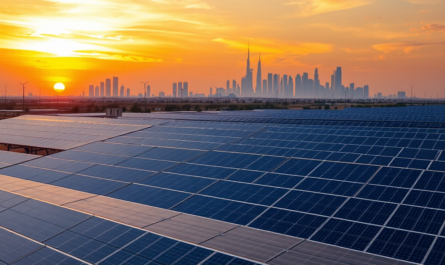Dubai’s Smart City initiatives have significantly transformed the business landscape, fostering an environment ripe for investment and innovation. By leveraging advanced technologies and sustainable practices, these initiatives enhance operational efficiency while attracting global investors. The main topic of this article delves into how these initiatives are reshaping business dynamics and investment trends within the region. The integration of smart solutions not only streamlines processes but also opens new avenues for economic growth. This article explores the implications of these initiatives on various sectors, the benefits they offer to businesses, and the overall impact on investment in Dubai.
Understanding Dubai’s Smart City Initiatives

Dubai’s Smart City vision, initiated in 2013, aims to create a more efficient, sustainable, and livable urban environment. The government has developed a comprehensive strategy that integrates technology into various sectors, striving to enhance the quality of life for residents and visitors alike. Here are key components of the Smart City initiatives:
- Smart Transportation: Implementation of intelligent transport systems that optimize traffic flows and reduce congestion.
- Smart Utilities: Use of IoT technologies to monitor and manage water and energy consumption efficiently.
- Smart Governance: Digital services that streamline interactions between the government and citizens, providing transparency and efficiency.
- Smart Health: Adoption of health technologies to improve public health services and monitor community health trends.
- Smart Environment: Sustainable practices such as smart waste management to promote an eco-friendly urban space.
The Influence on Business Operations

The Smart City initiatives have revolutionized how businesses operate in Dubai. Companies can streamline their operations through the use of digital tools and enhanced infrastructure, which leads to increased productivity and profitability. The introduction of smart technologies facilitates better decision-making based on real-time data analytics. Major impacts include:
- Efficiency Gains: Automated systems reduce manual processes, allowing businesses to focus on core activities.
- Cost Reductions: Smart utilities lead to lower operational costs through efficient resource use.
- Enhanced Customer Engagement: Technologies like AI help companies better understand and cater to their customers’ needs.
- Data-Driven Insights: Firms can leverage data analytics to develop targeted strategies and products.
- Cultural Shift: The adoption of smart technologies encourages innovation and agility within organizations.
Dubai’s Smart City initiatives present numerous investment opportunities, particularly in sectors such as technology, sustainability, and infrastructure. Investors are drawn to the vibrant ecosystem fostered by these initiatives, which support entrepreneurship and innovation. Key investment opportunities include:
- Tech Startups: The growth in tech-driven solutions results in funding opportunities for startups focused on smart technologies.
- Real Estate Development: Smart buildings equipped with technological amenities are increasingly attractive to both investors and consumers.
- Green Technologies: Sustainability initiatives encourage investment in renewable energy and waste management solutions.
- Transportation Innovations: The demand for smart transportation solutions creates market potential for investment in infrastructure improvements.
Challenges Amidst the Transformation
While the Smart City initiatives offer remarkable advantages, they also present certain challenges. Businesses and investors need to navigate these complexities effectively to harness the full power of this transformation. Some of the prominent challenges include:
- High Initial Costs: The upfront investment required for integrating smart technologies can be significant for smaller businesses.
- Regulatory Framework: There is a need for clear regulations that govern the use of new technologies to protect public interests.
- Data Security Concerns: As reliance on digital solutions increases, ensuring data security remains paramount.
- Market Competition: The rapid pace of technological adoption increases competition among businesses striving to innovate.
- Skill Gaps: Educating the workforce to proficiently handle new technologies poses a challenge for many sectors.
Conclusion
In conclusion, Dubai’s Smart City initiatives profoundly influence business operations and investment opportunities within the region. The integration of smart technologies enhances efficiency, reduces costs, and provides new investment avenues that are proving attractive to global investors. While challenges remain, the potential for economic growth and development is significant, positioning Dubai as a leader in innovative urban environments. As the city continues to evolve, the dynamics of business and investment will surely adapt to the ongoing changes driven by these initiatives.
Frequently Asked Questions
- What are the main goals of Dubai’s Smart City initiatives? The primary goals include enhancing the quality of life, improving operational efficiency, and promoting sustainability through smart technologies.
- How do the Smart City initiatives affect investors? These initiatives attract investors by creating a vibrant ecosystem for technology and innovation, offering numerous investment opportunities across various sectors.
- What sectors benefit most from Smart City developments? Sectors such as technology, real estate, transportation, and sustainability experience the most significant benefits from these developments.
- Are there any risks associated with investing in Dubai’s Smart City? Yes, risks include high initial costs, regulatory challenges, data security concerns, and increased market competition.
- How can businesses adapt to the changes introduced by Smart City initiatives? Businesses can adapt by investing in training, embracing new technologies, and focusing on data-driven decision-making to meet new market demands.



